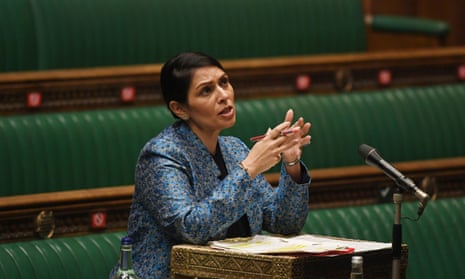Migrants who arrive in the UK by small boats or other illegal routes will be indefinitely liable for removal even if they are granted asylum under punishing proposals to be announced by Priti Patel.
In what the government is billing as the “biggest overhaul of the UK’s asylum system in decades”, the home secretary will announce on Wednesday that how people enter the UK will have a bearing on the progress of their asylum claim and their status if that claim is successful.
Experts criticised the creation of a “two-tier” system that risked punishing people “forced to take extraordinary measures [without] a choice about how they seek safety”.
Patel will vow to make every effort to remove those who enter the UK via routes deemed illegal, having travelled through a safe country in which they “could and should have claimed asylum”, under the “New Plan for Immigration”.
If it is not possible to remove them, migrants making successful claims having entered illegally will receive a new temporary protection status rather than an automatic right to settle – and will be regularly reassessed for removal from the UK.
People entering illegally will be further punished with limited family reunion rights and limited access to benefits.
Earlier this week it was reported that migrants who come to the UK through a safe and legal resettlement route, conversely, will get indefinite leave to remain immediately upon arriving in the UK under the plans.
Currently, resettled refugees get permission to stay in the UK for five years after which they must apply again for indefinite leave to remain.
It has also been reported that asylum seekers will be shipped overseas while their claims are processed, under the proposals, though this was not mentioned in a press statement issued ahead of Wednesday’s announcement.
The proposals have been drawn up against a backdrop of a record number of asylum seekers arriving in the UK last year in small boats across the Channel, with some political commentators suggesting Boris Johnson was frustrated with Patel’s poor handling of the situation.
However, official figures show the total number of asylum applications received in the UK last year actually fell by nearly a fifth as alternative means of travel – such as lorries – were hit by the pandemic.
Patel, who is expected to address the House of Commons on Wednesday, said: “I make no apology for these actions being firm, but as they will also save lives and target people-smugglers, they are also undeniably fair.”
For migrants who have their applications refused, the government said it will reform the appeals and judicial process to speed up removal. Other proposals, which it is understood will be put out for consultation, include:
Reception centres for asylum seekers while their claims are being processed.
Clarifying the standard on what qualifies as a “well-founded fear of persecution” and making it harder for people to be granted refugee status based on unsubstantiated claims.
Strict age assessment processes, with a national age assessment board to stop adult migrants pretending to be children.
Life sentences for people-smugglers and increasing the penalty for foreign national offenders who return to the UK in breach of a deportation order from six months’ imprisonment to five years.
The Home Office said it will expand the global reach of resettlement routes for refugees – channels facilitated by international organisations such as the UN Refugee Agency to provide safe and legal routes to the UK.
Enver Solomon, the chief executive of the Refugee Council, said: “The government is seeking to unjustly differentiate between the deserving and undeserving refugee by choosing to provide protection for those fleeing war and terror based on how they travel to the UK.
“The reality is that, when faced with upheaval, ordinary people are forced to take extraordinary measures and do not have a choice about how they seek safety. The government is effectively creating a two-tier system where some refugees are unfairly punished for the way they are able to get to the UK.
“This is wholly unjust and undermines the UK’s long tradition of providing protection for people, regardless of how they have managed to find their way to our shores … All refugees deserve to be treated with compassion and dignity, and it’s a stain on ‘Global Britain’ to subject some refugees to differential treatment.”
